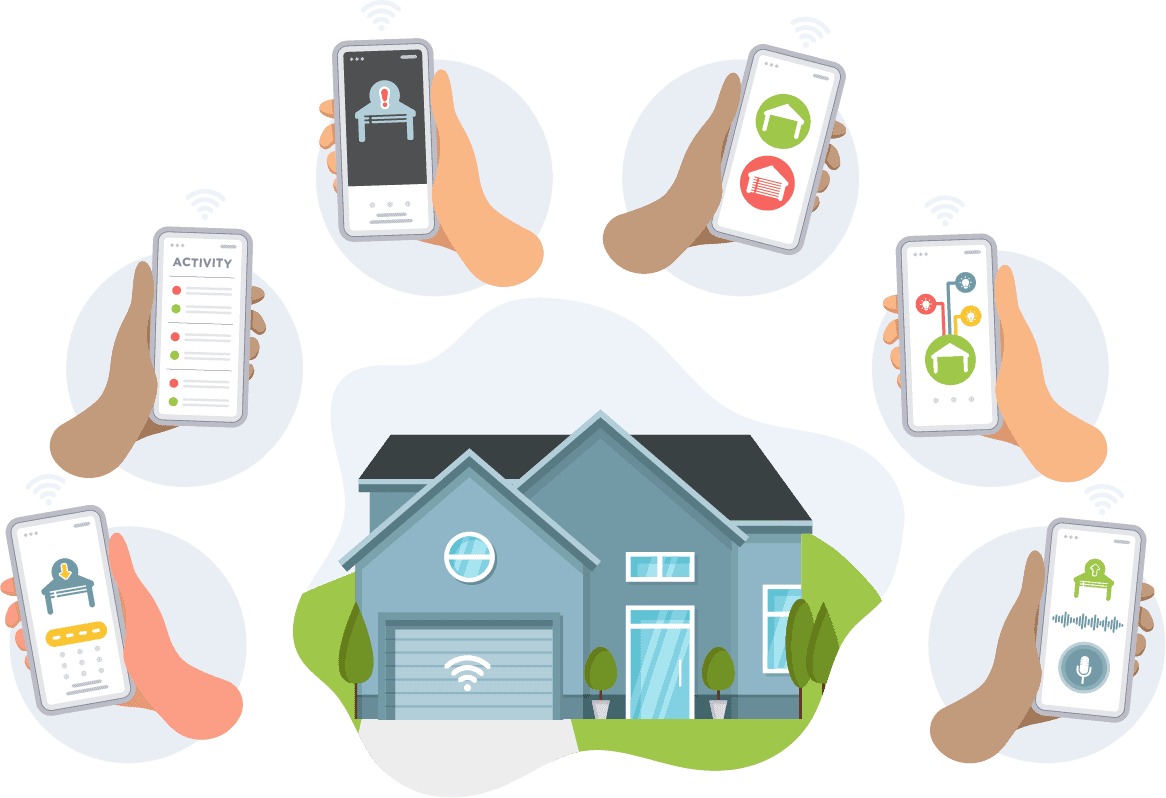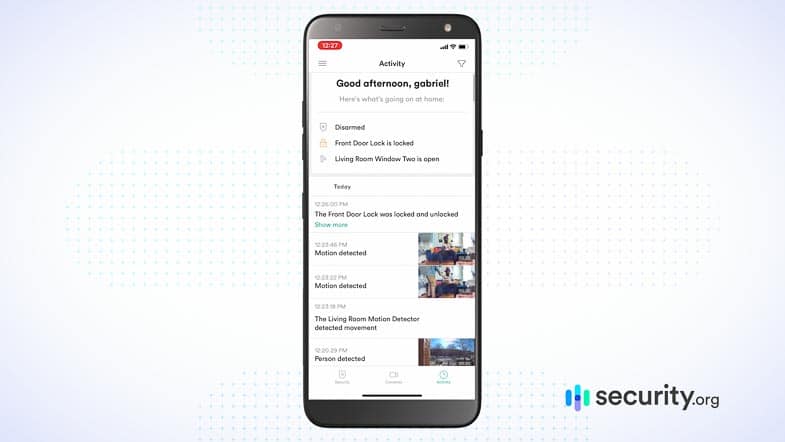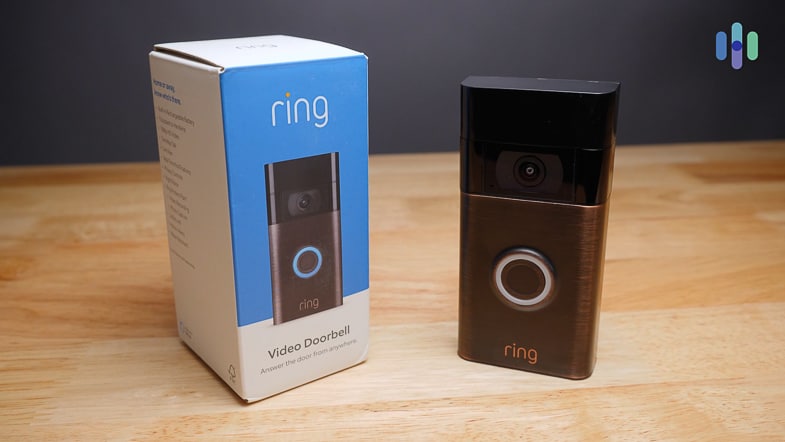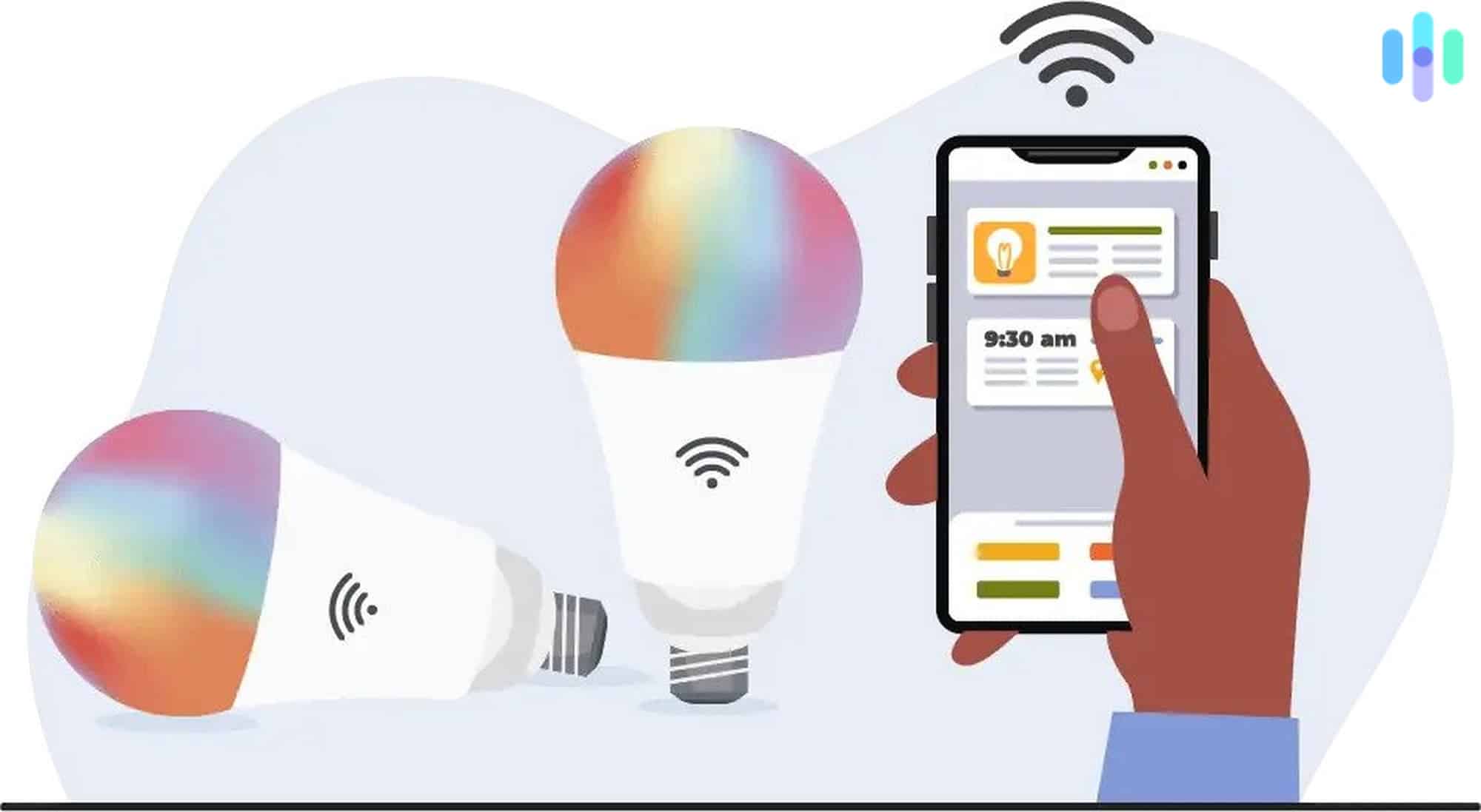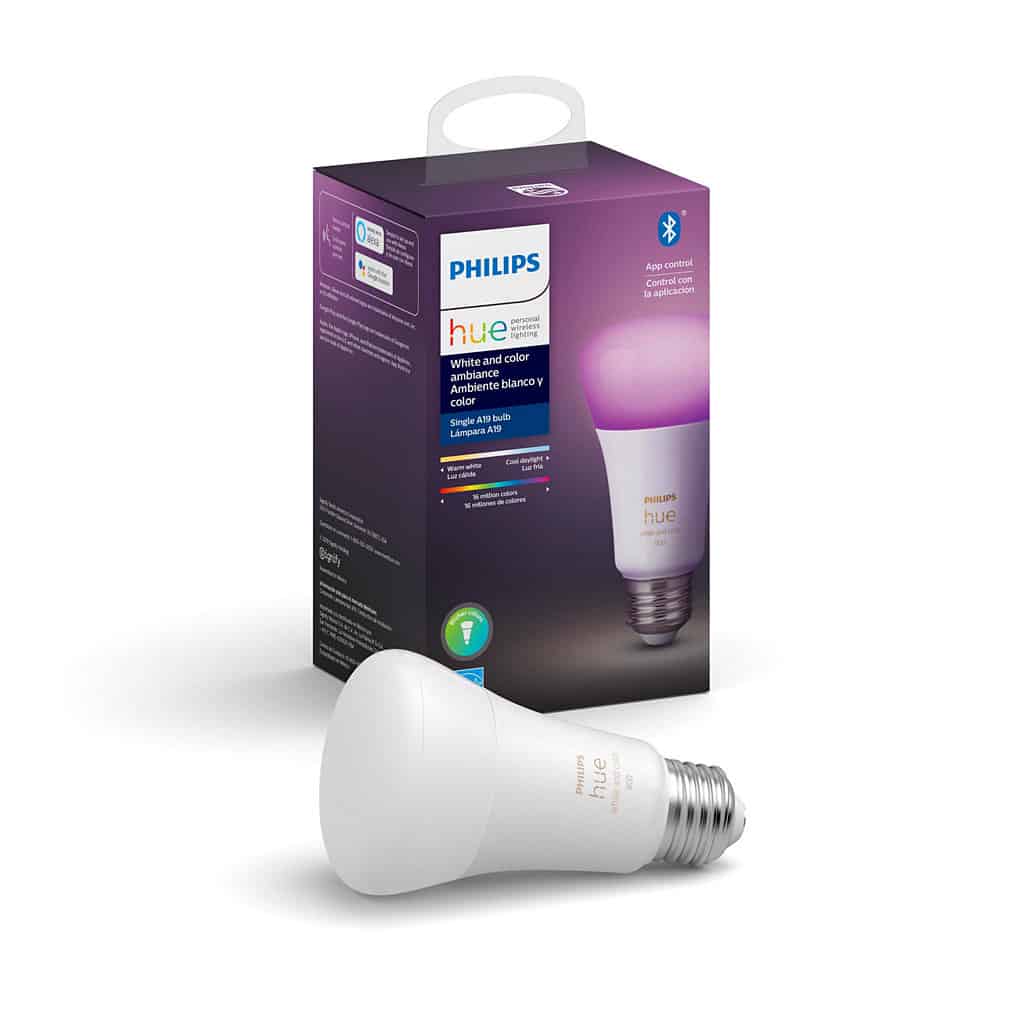If you’re tired of your garage door clicker not functioning right, it might be time to upgrade to a smart garage door opener. It works just like an automatic garage door, but instead of a clicker that relies on easily-interrupted radio frequencies, you can control a smart garage door opener with your phone or your voice. You might even be able to program it so that it opens as soon as you’re close to the house.
Many people seem to think, though, that smart garage door openers are expensive, difficult to set up, or not compatible with their garage doors. That’s not true; in fact, you might not need to replace your existing garage door opener to make it smart. This article will show you how to make your garage door smart so it works for you, not the other way around.
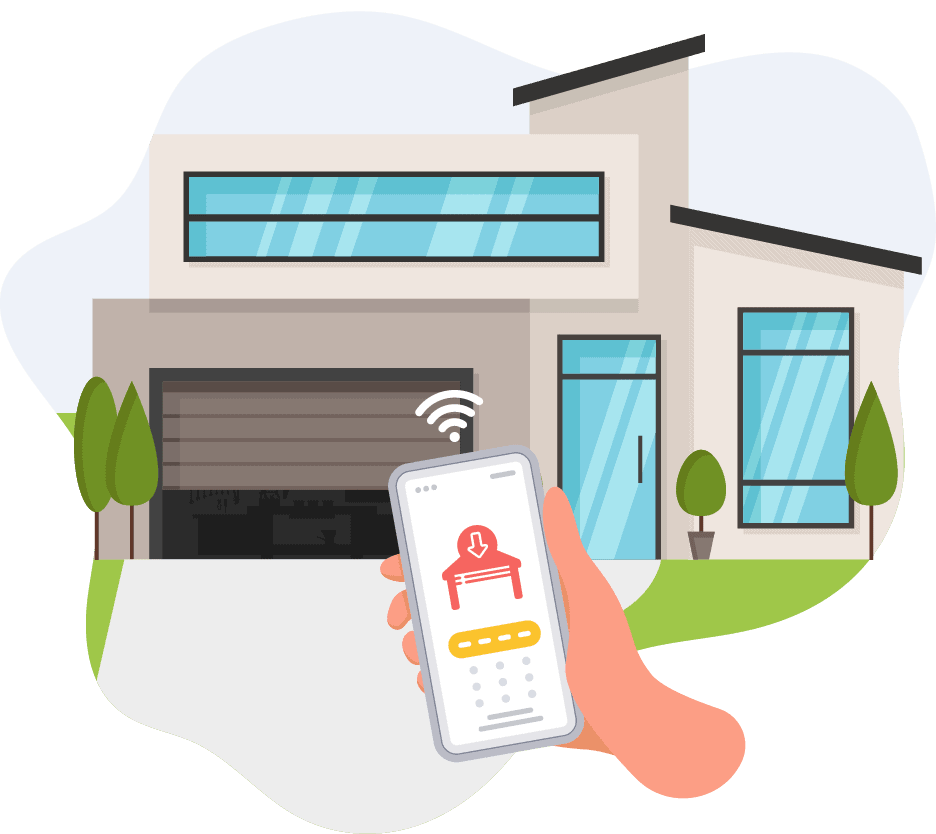
How To Make a Garage Door Smart
There are two basic ways to make your garage door smart: You can replace it with a smart garage door opener, or you can make your existing opener smart. It all depends on the make and model of your current garage door opener.
Replace Garage Opener
- Who should do it: If your existing garage door opener was manufactured in or before 1993, we’re sorry to tell you, but the only course of action is to completely replace it. Garage door openers that old can no longer work with current smart garage door technology.
- Installation: Installing a garage opener from scratch takes two to four hours and is fairly difficult, so you might want to hire a professional. You’ll need:
- Laser level
- Screwdriver
- Open-end wrench
- Ratchet and socket
- Power drill
- Tape measure
- Lag bolts
While the exact instructions might differ based on the make and model, here’s a general overview of how to install a garage door opener:
- Assemble the carriage tube.
- Mount the carriage tube.
- Put the carriage over the tube.
- Mount the header bracket.
- Hang the power unit from the ceiling.
- Attach the bracket that will connect the power unit to the carriage arm.
- Plug in your safety device.1
Make Existing Garage Opener Smart
- Who should do it: If your garage door opener was manufactured after 1993 and has standard safety sensors, you don’t have to replace it completely. Rather, you can buy a hub, like the Chamberlain myQ Smart Garage Hub, to make your “dumb” garage door opener smart. This works with both sectional and single-panel garage doors.
- Installation: Again, the installation process will depend on the smart hub, but for the myQ Smart Garage Hub, you’ll need:
- Smartphone
- Wi-Fi router with 2.4 GHz frequency
- Wi-Fi network and password
- Strong Wi-Fi signal
- Compatible garage door opener (see chart below)
FYI: If your Wi-Fi signal isn’t strong enough, you may need to add a range extender or, if you’re in a mesh Wi-Fi system, another node.
Follow these steps to install the hub and pair it with your iOS device:
- Log in to the myQ app.
- Tap the Smart Garage Hub.
- Hit Next.
- Plug in the Hub. It should blink blue.
- If it doesn’t blink blue, unplug the hub and plug it back in. If you still don’t see a blinking blue light, press and hold the gear button until it flashes blue, then release. Repeat and the hub should reset. Unplug it again and then plug it back in.
- Hit Next.
- Scan the serial number on the back of the hub.
- Tap Join.
- Choose your Wi-Fi network.
- Enter your password.
- Hit Next twice.
- Remove your door sensor’s tab.
- Hit Next.
- Press and hold the door sensor button until it beeps and flashes.
- Hit Next.
- Follow the rest of the app steps to install the door sensor.2
Benefits of a Smart Garage Door
One common misconception about smart garage door openers is that you’re simply moving your controls from the traditional clicker to your smartphone. That is one of the benefits of having a smart garage door, but it’s far from the only one.
- Remote control: Clickers have a limited wireless range, but since smart garage door controllers are Wi-Fi-connected, you can control them from anywhere provided that your phone is connected to the internet. That means even if you forgot to close the garage after leaving for work, you don’t have to make a U-turn back to your house. (Important: Keep the garage door free from any obstructions at all times.)
- Activity log: You’ll also be able to see a log of your garage door’s activity throughout the day, so you can track exactly when someone opens or closes it. And again, if someone left it open, you can always close your garage door from the app.
- Notifications: Better yet, you can get a notification whenever your garage door opens or closes to stay on top of your home’s security.
- Smartphone control: Rather than using a remote, you can use your phone as the remote.3 You don’t have to keep your clicker in your car, which is also safer. Picture this: If someone broke into your car and found the clicker, they’d be able to open your garage and take your tools and other valuable items you keep there – or worse, access your house.
- Home automation: You can have your garage door controller trigger other devices, and vice versa. For example, we have our smart lights turn on when our garage door opens so we can find our way out of the car clearly. Learn more about smart home automation and smart homes in general.
- Voice commands: Some garage door openers even work with voice assistants. This one’s more of a luxury than a necessity, but imagine being able to go straight to backing your car out of the garage just by saying, “Alexa, open the garage door.”
Garage Wi-Fi
Is the Wi-Fi signal in your garage strong enough to support your controller? Here’s how to check.
- Check your Wi-Fi’s signal strength in your garage. You can do this with a number of mobile apps for both iOS and Android devices, such as WiFi Analyzer.
- If it’s not strong, add a range extender or, if you use a mesh Wi-Fi system, a node.
- If your signal still isn’t strong enough, replace your router.
How To Choose a Smart Garage Door Opener
If you’re buying a new smart garage door opener from scratch, you have a few key factors to consider.
Type of Drive
First, choose your garage door opener based on the material of the garage door itself. The types of openers differ in how they lift the door, their costs, maintenance, and noise levels, so we’ve compiled a chart below with some help from Eudy Door Co.4 and A Better Garage Door Inc.5
| Drive type | How it lifts door | Cost | Best for | Maintenance required | Noise level |
|---|---|---|---|---|---|
| Chain | Thick chain | Affordable | Standard aluminum garage doors | Not much | Loud |
| Belt | Steel-reinforced rubber belt | Expensive | Steel garage doors | Regular maintenance/ replacement, easily damaged | Quiet |
| Screw | Threaded rod lift mechanism | Average | Any garage door | Tightening screws and bolts every few months | Quiet |
| Direct | Stationary chain in a steel rail | Expensive | Any garage door | Not much | Quiet |
Horsepower
For a garage door opener, the horsepower determines how much power it has to lift the physical garage door. Standard doors will need 0.5 horsepower, while heavier doors will need either 0.75 or 1 horsepower.6
| Horsepower | Best for |
|---|---|
| 0.5 | Aluminum garage doors |
| 0.75 | Steel or wood garage doors |
| 1 | Steel or wood, very large and heavy garage doors |
Compatibility
If your garage door opener was made after 1993, then you can use a smart hub like the Chamberlain myQ Smart Garage Hub to make it connected. However, not all makes and models work with this hub, so check below.7 Note that there are tons of hubs you can use, but we couldn’t outline each one’s compatibility here.
| Brand of existing garage door opener | Model | Works out of box with myQ app | Works with Chamberlain myQ Smart Garage Hub | Garage door opener needs to be completely replaced |
|---|---|---|---|---|
| Chamberlain | Wi-Fi | Yes | No | No |
| Chamberlain | No Wi-Fi | No | Yes | No |
| LiftMaster | Wi-Fi | Yes | No | No |
| LiftMaster | No Wi-Fi | No | Yes | No |
| Craftsman | Wi-Fi | Yes | No | No |
| Craftsman | No Wi-Fi | No | Yes | No |
| Raynor | Wi-Fi | Yes | No | No |
| Raynor | No Wi-Fi | No | Yes | No |
| Genie | Alliance | No | No | Yes |
| Genie | BeltLift | No | Yes | No |
| Genie | Blue Max | No | No | Yes |
| Genie | Chain Glide | No | Yes | No |
| Genie | ChainLift | No | Yes | No |
| Genie | ChainMax | No | Yes | No |
| Genie | DirectLift | No | Yes | No |
| Genie | DirectLift Plus | No | Yes | No |
| Genie | Excelerator | No | Yes | No |
| Genie | GPower | No | Yes | No |
| Genie | IntelliG | No | Yes | No |
| Genie | Medallion | No | No | Yes |
| Genie | Norelco | No | No | Yes |
| Genie | PowerLift | No | Yes | No |
| Genie | PowerLift Excelerator | No | Yes | No |
| Genie | PowerMax | No | Yes | No |
| Genie | ProMax Stealth | No | Yes | No |
| Genie | QuietLift | No | Yes | No |
| Genie | ReliaG | No | Yes | No |
| Genie | Screw Drive Series H | No | Yes | No |
| Genie | Screw Drive Series IC | No | Yes | No |
| Genie | Screw Drive Series IS | No | Yes | No |
| Genie | Screw Drive Series ISL | No | Yes | No |
| Genie | SilentMax | No | Yes | No |
| Genie | Stealth | No | Yes | No |
| Genie | TriloG | No | Yes | No |
| Overhead | Destiny | No | Yes | No |
| Overhead | Legacy | No | Yes | No |
| Overhead | Odyssey | No | Yes | No |
| Overhead | OverDrive | No | Yes | No |
| Overhead | Phantom | No | Yes | No |
| Overhead | Python | No | Yes | No |
| Overhead | Signature | No | Yes | No |
| Overhead | SilentMax | No | Yes | No |
| Overhead | Standard | No | Yes | No |
| Linear | N/A | No | Yes | No |
| Wayne Dalton | Classic Drive | No | No | Yes |
| Wayne Dalton | Doormaster | No | Yes | No |
| Wayne Dalton | iDrive | No | Yes | No |
| Wayne Dalton | Prodrive | No | Yes | No |
| Wayne Dalton | Quantum | No | No | Yes |
| Access Master | N/A | Yes | No | No |
| BuildMark | N/A | No | Yes | No |
| Do-It | N/A | No | Yes | No |
| Master Mechanic | N/A | No | Yes | No |
| AssureLink | N/A | No | Yes | No |
| True Value | N/A | No | Yes | No |
| Garage Access | N/A | No | Yes | No |
| Merlin | Wi-Fi | Yes | No | No |
| Merlin | No Wi-Fi, myQ logo | Yes, works with myQ-compatible Commander Essential, Commander Elite, Commander Extreme, SilentDrive, SilentDrive Elite | No | No |
| Merlin | No Wi-Fi, no myQ logo | No | No | Yes |
Smart Home Integrations
If you’re already in a smart home ecosystem, you’ll want a controller that works with your voice assistant and can trigger other IoT devices in your home.
Power Options
There are a few power options for garage door openers.
- Wireless: A battery-operated garage door opener won’t be dependent on your home’s power. It’ll run through either a Wi-Fi extender (to increase your router’s coverage) or mesh Wi-Fi, a network of router and satellite nodes. We’ve tested out Nest Wi-Fi, a mesh Wi-Fi network, for our article on the best smart home devices, so check that out if you’re not sure where to start.
- Ethernet cables: If you don’t want to replace the door opener’s batteries, you can run an Ethernet cable from your controller through your walls.
- Power line: The last option is to hardwire your garage door control into your home’s existing electrical wiring.
Pro Tip: If your garage door controller is dependent on your home’s power, make sure it has a backup battery in case of power outages.
Pricing
Depending on whether you have to replace your controller or add a smart hub, the price of a smart garage door opener ranges from about $40 to $120. The myQ Smart Hub we referenced earlier is $38.99, or $56.98 if you pair it with a Wi-Fi extender.
Mobile App
Smart garage door controllers should have smart apps to match, so look for decent ratings in the Apple App Store and Google Play Store.
Garage Door Extras
If there’s still room in your wallet, you might want to invest in a few garage accessories, such as these:
- Wall push button
- Surge protector
- Keypad
- Remote
- Light bulb8
Recap
A garage door that you can open and close remotely will do wonders for your home security, but we suggest getting a home security system with cameras and sensors in your garage as well. Securing your home is never a one-step process, but smart home technology can certainly help protect your home from invasion. If nothing else, it’s certainly more convenient than running back home to close your garage!
Frequently Asked Questions
Installing or updating your garage door opener isn’t the most straightforward process in the world, so if you still have questions, we’re here to help.
-
Can I make my garage door opener smart?
If your garage door opener was manufactured after 1993, then most likely, yes, you will be able to make it smart. If it was manufactured before 1993, you’ll probably have to buy an entirely new smart garage door opener.
-
How do I add Wi-Fi to my garage door?
To add Wi-Fi to your garage door, find a compatible smart home hub and pair it with your Wi-Fi network.
-
How do you make a LiftMaster garage door smart?
If your LiftMaster garage door is already connected to Wi-Fi, you can make it smart by pairing it with the myQ app. You can make a non-Wi-Fi LiftMaster garage door smart by connecting it to the Chamberlain myQ Smart Garage Hub.
-
Is a smart garage door opener worth it?
Smart garage door openers are worth it. They can cost around $40, so they won’t break the bank but will make your garage safer and more convenient.



